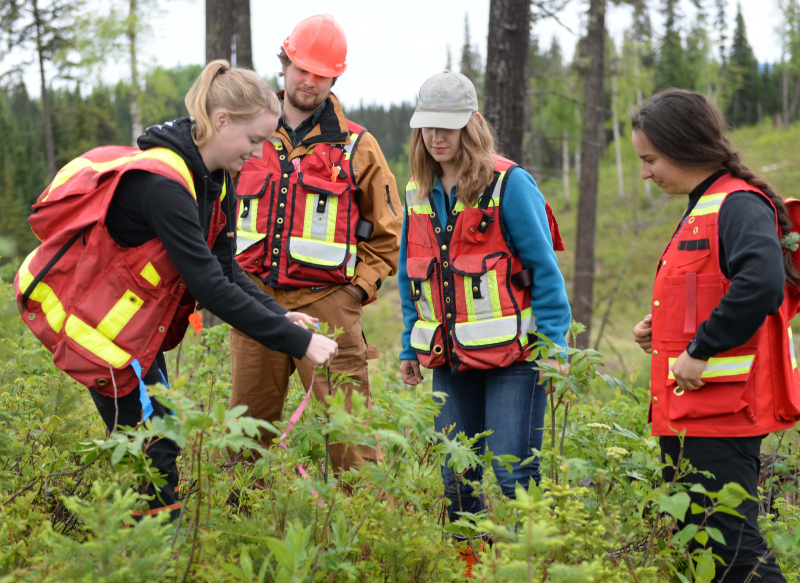Students Benefit from Classroom in the Woods
A classroom in the woods, on a hilltop overlooking the Upper Fraser area and the MacGregor Mountains, provides a great space for outdoor learning and research in forest ecology, forest and ecosystem management and environmental studies. And it’s because donors have made it possible.

Samantha Gonzalez brags to her friends that she gets paid to hike around every day.
There’s work involved too, which includes silviculture surveys on young seedlings or 100-year-old trees and block layouts for industry.
It’s all in a day’s work amongst the timber stands at UNBC’s Aleza Lake Research Forest, located 60 km east of Prince George.
Gonzalez, who graduated with her Bachelor of Natural Resources Management with a major in Forestry and a minor in Outdoor Recreation and Conservation degree in 2015, spent three-straight summers working as an intern before being hired as a full-time employee.
It’s a job she wouldn’t trade for anything.
“It’s nice to be excited about going to work every day,” she said. “It’s just nice being out here. You get connected with the area and know the places that you’re going.”
And it’s because donors have made it possible.
Dunkley Lumber, Moss Rock Park Foundation and Integris Credit Union -- helped build the Field Education Centre which opened its doors in May 2016.
The building is a 1,200 square-foot interpretive centre of log and timber construction, designed to host field courses, meeting, retreats, training and community events.
It’s essentially a classroom in the woods on a hilltop overlooking the Upper Fraser area and the MacGregor Mountains, providing a great space for the University’s faculty and students, for outdoor learning and research in forest ecology, forest and ecosystem management and environmental studies.
The Aleza Lake Research Forest Society is operating the Centre as an environmental learning centre, gathering place and hub for events at the 9,000-hectare research forest.
Befitting its forest setting, the Centre strongly incorporates and highlights northern B.C. wood in almost all facets of its construction, with a high level of craftsmanship throughout. Its construction, spread over two years, included the expertise of eight local contractors, and materials and supplies from 13 additional local businesses.
Donors also help fund the paid internship program where UNBC students are hired for the summer.
Gonzalez was fortunate to transfer the skills she learned in the classroom to her work as an intern.
“We did some outdoor labs in school which are great, but as soon as you’re out here in the summer you apply everything you’ve learned that year,” she said.
“We couldn’t do this work without donor support, especially building the centre.”
She credits Mike Jull, the manager of the Aleza Lake Research Forest Society and Colin Chisholm, the Society’s assistant manager for being her mentors in the forest, learning even more.
The Aleza Lake Research Forest began as a B.C. Forest Service Experiment Station in 1924. It was the first experiment station of its kind in the province.
